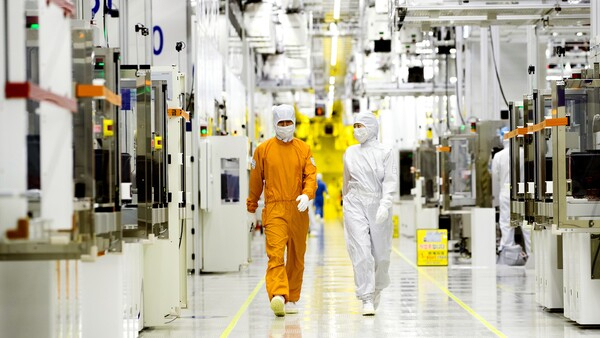 |
Inside Samsung Electronics' semiconductor manufacturing plant in Pyeongtaek, Gyeonggi Province (Samsung Electronics) |
Amid intensifying competition for chip supremacy, Korean lawmakers are pushing to lift the national cap on working hours to give chipmakers more flexibility. The ruling party's proposal, however, has sparked mixed reactions, with critics labeling it "regressive."
In South Korea, home to the world's top memory chip makers Samsung Electronics and SK hynix, employees are prohibited from working more than 52 hours per week -- consisting of 40 regular hours and up to 12 hours of overtime with worker consent.
Although the work-hour cap was implemented in 2018 to promote work-life balance, the law is frequently criticized for hindering growth in key industries.
"Inefficient regulations in the labor market are hurting the competitiveness of companies and limiting them from making investments," Sohn Kyung-sik, the chairman of the Korea Enterprises Federation, said at a parliamentary conference earlier this month.
To address growing calls for government backing of the chip industry, the ruling People Power Party recently proposed a support package that includes a special act exempting chip research and development workers from the nation's 52-hour workweek regulation, along with a law to establish grounds for a direct subsidy for the industry.
With lawmakers aiming to pass the support program before the end of the year, the work hour exemption act has become a source of controversy that divides the industry.
Proponents argue that the measure is necessary for Korean chipmakers to keep up with global competition, especially when overseas rivals often work without restricted work hours.
Nvidia, the world’s largest supplier of advanced graphic processing units and the rising star in the AI era, has been reported to push its employees to their limits in intense work environments with long work hours.
TSMC, the Taiwanese contract chip manufacturer that produces more than 90 percent of the world's most advanced chips, is also known for its intense workload, with its engineers working 12-hour days and on weekends.
These companies reportedly offer generous compensation for the demanding workload.
Korean chipmakers are strictly bound to the 52-hour limit. Samsung Electronics, for example, implements a company system that sends warning messages to employees and their supervisors when a worker reaches 52 hours.
"There are engineers who complain they have to leave the office to work outside, due to the work hour cap," an industry official said under condition of anonymity.
"Theoretically, it makes sense that companies should match their working hours with their rivals to compete on equal footing."
On the other hand, labor rights advocates strongly oppose the envisioned exemption act, saying it will only worsen the work environment without achieving much.
“They talk about implementing a Korean version of the white-collar exemption rule for technological development. But is it really the work hour cap that prevented the company from developing HBM (on time)?" a Samsung engineer posted on Blind, an online community platform of employees, referring to the High Bandwidth Memory chip.
While the HBM chips have come in high demand as crucial components for AI chips, Samsung has been lagging behind its crosstown rival SK hynix in the supply race.
The National Samsung Electronics Union has released a statement opposing the 52-work-hour exemption, citing how there is a special work-hour extension system.
“The idea of increasing the work hours to improve global competitiveness reflects the backward mindset of a developing country,” the labor union said.
Another Samsung labor union, the Samsung Group United Union, insists the exemption law is OK as long as the company provides compensation that matches the labor.
Some also point out that the country already has a special work hour extension system that allows companies to extend work hours for approved workforce once they get approval from the labor minister. Under the system, chip companies can apply for work hour extensions of up to 64 hours per week for three months.
Samsung Electronics chip business and some workforce at the company's mobile device business are currently working under the extended-hour program.
The proposed exemption act would make the process for companies to extend working hours simpler than getting approval from the minister, an industry official explained.
"Companies are watching closely over the act. But I do not think a drastic change will occur in work culture," an industry official said under the condition of anonymity. "Opinions vary among laborers, but in the industry overall, the proposal is seen to offer an option for companies, which is not bad."
Some critics also point out that work hours are not a critical factor in technology development, as seen from the contrasting performance of Samsung Electronics and SK hynix this year.
“If Korea’s entire chip industry suffered, adjusting the work hours may be one cure. But SK hynix excelled under the 52-hour system. A company needs to focus on its core competencies or management strategies, as environmental factors have limited influence,” said Hwang Yong-sik, a professor at Sejong University College of Business and Economics.







![[Herald Interview] How Gopizza got big in India](http://res.heraldm.com/phpwas/restmb_idxmake.php?idx=644&simg=/content/image/2024/11/20/20241120050057_0.jpg)